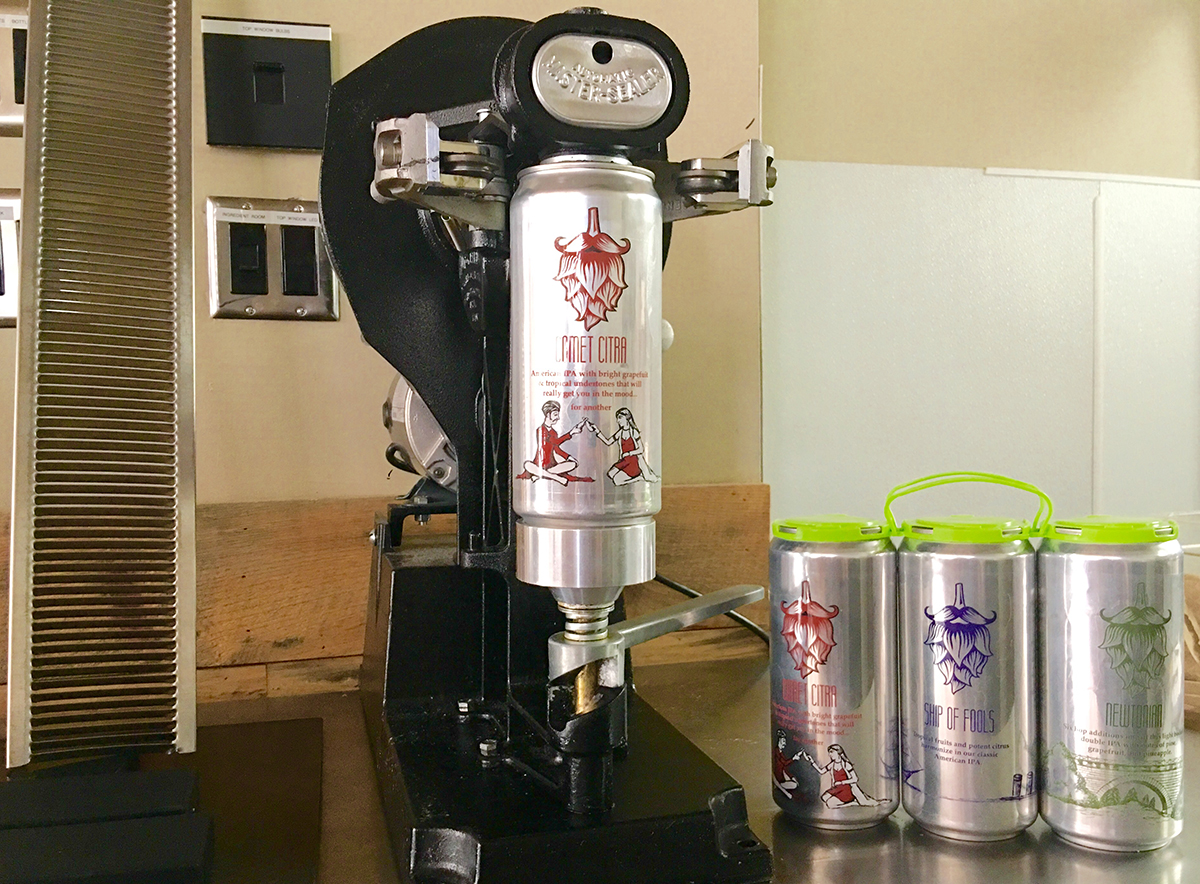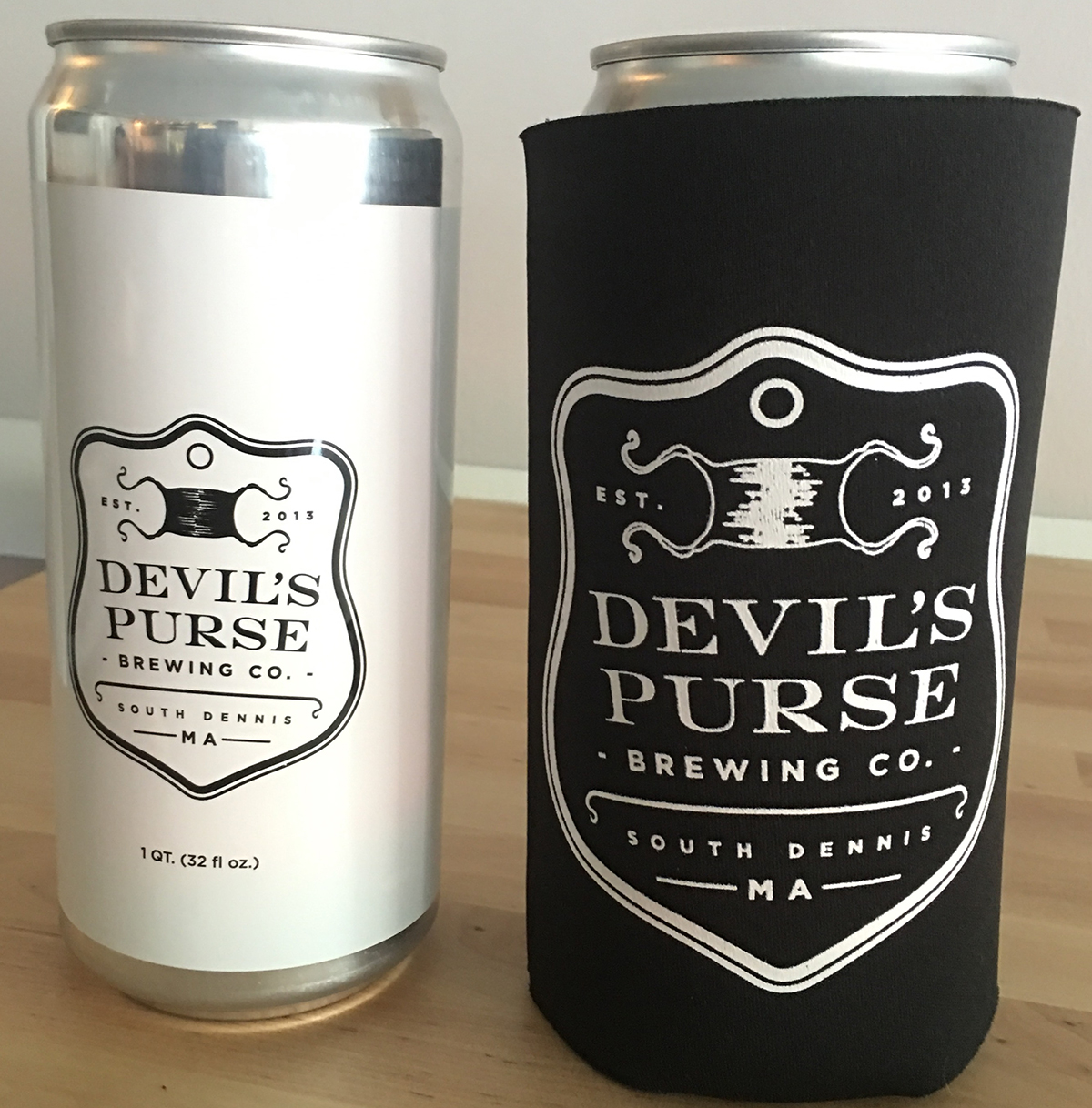The Rise of the Crowler in Massachusetts

Crowlers at Hopsters. / Photo provided
If you’ve visited Hopster’s Alley in the Boston Public Market within the last two weeks, you might have noticed gigantic cans of Hopsters’ IPAs lining cooler shelves. Breweries are calling these massive vessels “crowlers,” and they’re the newest way places like Hopsters are packaging their beer.
Simply a “can” plus a “growler,” the word for the glass jugs breweries commonly fill with fresh beer to go, crowlers are essentially a 32-ounce tallboy. The benefits that make cans superior to glass also applies to crowlers.
“Skunky beer has a lot to do with light,” Hopsters owner Lee Cooper says. “Once you open a [64-ounce, glass] growler, you need to drink it in a day or two, which can be a big commitment. The can is half that size.”
In many cases, cans are also more eco-friendly, and they’re cheaper for breweries to distribute compared to glass. Therefore, they’re cheaper for the consumer. It’s also a great alternative to growlers, which are subject to a slew of restrictions from state regulators.
“If I get a growler from Jack’s Abby, [I] can’t come to Hopsters and get that filled,” Cooper says. “Ultimately if you have a crowler you don’t have to worry about that.”
That’s because crowlers are essentially the same, except consumers can simply recycle them with household refuse after the last pint, instead of bringing it back for a refill. Breweries treat it like a growler, filling a can with draft beer to order. For the moment, Hopsters only distributes its Newtonian double IPA, Ship of Fools IPA, and Comet Citra Session IPA in crowlers around Boston, but they can put any of their 20-plus beers in one for you at their brewery. And yes, that includes the beer you brew yourself in Newton—and soon, Fort Point.
Canned craft beer has seen a surge in popularity since Oskar Blues Brewery in Colorado launched Dale’s Pale Ale in 2002, and that same brewery is fueling the crowler craze. As Bon Appetit notes, Oskar Blues invented the crowler, and sells all the appropriately-sized cans and canning machines directly to other breweries. Once a brewery buys blank cans and the packaging machine, they can on slap their own labels and stickers and put them on shelves.
Or, if you’re Devil’s Purse Brewing Company on Cape Cod, you can slip your giant can into a branded crowler koozie.

Crowlers (and a crowler koozie) at Devil’s Purse Brewing. / Photo provided
“We just treat it like a regular can, albeit a very big one,” says Devil’s Purse co-owner and co-brewer Matt Belson. “Folks who are visiting the brewery and have too many glass growlers, or they’re from out of state, it gives them an option for a container.”
Belson, his partner Michael Segerson, and their team have packaged their beers in crowlers since day one at Devil’s Purse. Much like Hopsters, Devil’s Purse can put anything available on draft into a crowler. But Belson says it’s not always a question of crowler versus growler, since growlers are a great option for frequent customers. Crowlers are simply another way to enjoy your favorite local beer.
Devil’s Purse and Hopsters aren’t the only area breweries embracing the can. Somerville’s Aeronaut and the soon-to-open Notch in Salem are both in favor of putting their beer in crowlers, with Notch ditching glass growlers entirely.
“We don’t want to have the consumer have the burden to have to bring back the growler,” Notch owner Chris Lohring previously told Boston magazine.
Cooper says the average price of a crowler at Hopsters is around $10, while Belson says crowlers at Devil’s Purse can range from $8-10, depending on the beer. Some breweries, such as Aeronaut and Hopsters, offer a discount if you buy a several crowlers at a time.
“I would imagine that we’re all going to go to crowlers,” Cooper says. “You don’t have to pay that $4 deposit fee for a growler, and you may never go back to that brewery. If you’re in Waterbury and you’re visiting [Prohibition Pig], chances are you aren’t going to go back there.”
Bon Appetit reported that over 400 Oskar Blues crowler machines and 1.3 million crowler cans were sold in 2015, so it seems crowlers are having their moment in the limelight. Keep an eye on your favorite local breweries to see who is hopping on this trend.

